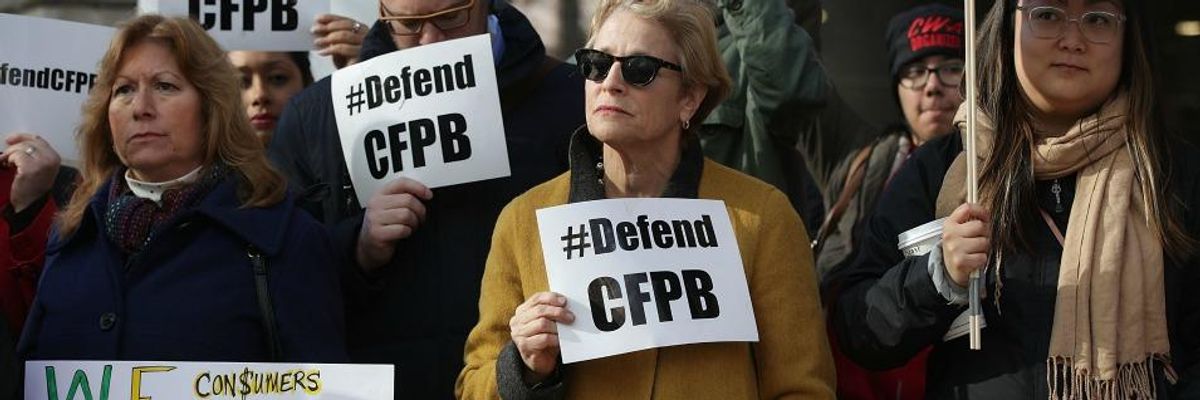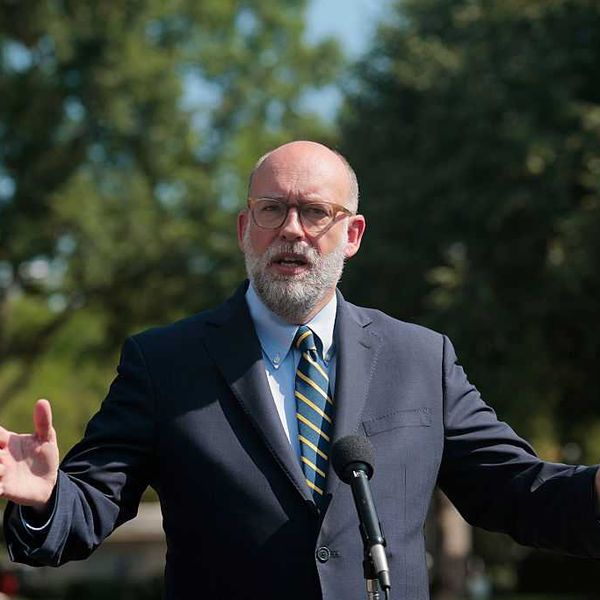
Supporters of the Consumer Financial Protection Bureau hold signs as they gather in front of the agency November 27, 2017 in Washington, D.C. (Photo: Alex Wong/Getty Images)
Victory for "Wall Street's Army of Lawyers and Lobbyists" as Supreme Court Puts CFPB Chief Under Trump's Control
"The far right has been trying for decades to do away with government protections for consumers so big corporations can run roughshod over all of us. This ruling just gave them a serious leg up."
The U.S. Supreme Court on Monday struck down a Consumer Financial Protection Bureau statute shielding the agency's director from being fired by the president without cause, a decision that critics warned threatens the bureau's ability to protect the public from corporate abuses without political interference.
The high court's conservative majority ruled that the CFPB provision requiring cause for the president to terminate the bureau's director gave the agency too much independence from the executive branch and was therefore unconstitutional. The court's decision severs the for-cause firing provision but leaves intact the rest of the agency, which was established in the wake of the 2008 financial crisis.
"Greedy banks, predatory lenders, and other financial scammers won't stop until the agency is fully dismantled."
--Jeremy Funk, Allied Progress
Sen. Elizabeth Warren (D-Mass.), one of the original architects of the CFPB, tweeted that the court's ruling hands "more power to Wall Street's army of lawyers and lobbyists to push out a director who fights for the American people."
"Even after today's ruling, the CFPB is still an independent agency," Warren said. "The director of that agency still works for the American people. Not Donald Trump. Not Congress. Not the banking industry. Nothing in the Supreme Court ruling changes that."
\u201cLet\u2019s not lose sight of the bigger picture: after years of industry attacks and GOP opposition, a conservative Supreme Court recognized what we all knew: the @CFPB itself and the law that created it is constitutional. The CFPB is here to stay.\u201d— Elizabeth Warren (@Elizabeth Warren) 1593443122
Jeremy Funk, spokesman for consumer watchdog group Allied Progress, said in a statement that the "CFPB's independence is what allowed it to be a powerful and effective advocate for consumers in the past, but the high court ruled that the agency should instead be guided by the political whims of the president."
"Greedy banks, predatory lenders, and other financial scammers won't stop until the agency is fully dismantled," said Funk.
The current director of the CFPB is Kathy Kraninger, a former White House budget official who President Donald Trump nominated in June of 2018 to replace then-Acting CFPB Director Mick Mulvaney, who has since left the White House.
"It goes without saying that the people who pay the highest price will be poor people and people of color."
-- Ben Jealous, People for the American Way
Mulvaney's appointment as acting chief of the CFPB was deeply controversial and--according to some consumer groups--illegal. Trump appointed Mulvaney to lead the CFPB in an acting capacity in 2017 after former director Richard Cordray resigned and attempted to name his deputy Leandra English as his replacement.
A Trump-appointed federal judge in November of 2017 rejected English's legal effort to stop Mulvaney from leading the agency.
Since being taken over by Trump appointees, the CFPB has repeatedly come under fire from advocacy groups for siding with corporate interests over consumers. The agency is currently finalizing a rule that watchdogs say could leave vulnerable people even more susceptible to the abuses of predatory lenders.
Ben Jealous, president of advocacy group People For the American Way, said in a statement that the Supreme Court's ruling Monday could tilt the CFPB even further in the direction of favoring corporate interests over consumers.
"The far-right has been trying for decades to do away with government protections for consumers so big corporations can run roughshod over all of us," Jealous said. "This ruling just gave them a serious leg up, and it goes without saying that the people who pay the highest price will be poor people and people of color."
An Urgent Message From Our Co-Founder
Dear Common Dreams reader, The U.S. is on a fast track to authoritarianism like nothing I've ever seen. Meanwhile, corporate news outlets are utterly capitulating to Trump, twisting their coverage to avoid drawing his ire while lining up to stuff cash in his pockets. That's why I believe that Common Dreams is doing the best and most consequential reporting that we've ever done. Our small but mighty team is a progressive reporting powerhouse, covering the news every day that the corporate media never will. Our mission has always been simple: To inform. To inspire. And to ignite change for the common good. Now here's the key piece that I want all our readers to understand: None of this would be possible without your financial support. That's not just some fundraising cliche. It's the absolute and literal truth. We don't accept corporate advertising and never will. We don't have a paywall because we don't think people should be blocked from critical news based on their ability to pay. Everything we do is funded by the donations of readers like you. Will you donate now to help power the nonprofit, independent reporting of Common Dreams? Thank you for being a vital member of our community. Together, we can keep independent journalism alive when it’s needed most. - Craig Brown, Co-founder |
The U.S. Supreme Court on Monday struck down a Consumer Financial Protection Bureau statute shielding the agency's director from being fired by the president without cause, a decision that critics warned threatens the bureau's ability to protect the public from corporate abuses without political interference.
The high court's conservative majority ruled that the CFPB provision requiring cause for the president to terminate the bureau's director gave the agency too much independence from the executive branch and was therefore unconstitutional. The court's decision severs the for-cause firing provision but leaves intact the rest of the agency, which was established in the wake of the 2008 financial crisis.
"Greedy banks, predatory lenders, and other financial scammers won't stop until the agency is fully dismantled."
--Jeremy Funk, Allied Progress
Sen. Elizabeth Warren (D-Mass.), one of the original architects of the CFPB, tweeted that the court's ruling hands "more power to Wall Street's army of lawyers and lobbyists to push out a director who fights for the American people."
"Even after today's ruling, the CFPB is still an independent agency," Warren said. "The director of that agency still works for the American people. Not Donald Trump. Not Congress. Not the banking industry. Nothing in the Supreme Court ruling changes that."
\u201cLet\u2019s not lose sight of the bigger picture: after years of industry attacks and GOP opposition, a conservative Supreme Court recognized what we all knew: the @CFPB itself and the law that created it is constitutional. The CFPB is here to stay.\u201d— Elizabeth Warren (@Elizabeth Warren) 1593443122
Jeremy Funk, spokesman for consumer watchdog group Allied Progress, said in a statement that the "CFPB's independence is what allowed it to be a powerful and effective advocate for consumers in the past, but the high court ruled that the agency should instead be guided by the political whims of the president."
"Greedy banks, predatory lenders, and other financial scammers won't stop until the agency is fully dismantled," said Funk.
The current director of the CFPB is Kathy Kraninger, a former White House budget official who President Donald Trump nominated in June of 2018 to replace then-Acting CFPB Director Mick Mulvaney, who has since left the White House.
"It goes without saying that the people who pay the highest price will be poor people and people of color."
-- Ben Jealous, People for the American Way
Mulvaney's appointment as acting chief of the CFPB was deeply controversial and--according to some consumer groups--illegal. Trump appointed Mulvaney to lead the CFPB in an acting capacity in 2017 after former director Richard Cordray resigned and attempted to name his deputy Leandra English as his replacement.
A Trump-appointed federal judge in November of 2017 rejected English's legal effort to stop Mulvaney from leading the agency.
Since being taken over by Trump appointees, the CFPB has repeatedly come under fire from advocacy groups for siding with corporate interests over consumers. The agency is currently finalizing a rule that watchdogs say could leave vulnerable people even more susceptible to the abuses of predatory lenders.
Ben Jealous, president of advocacy group People For the American Way, said in a statement that the Supreme Court's ruling Monday could tilt the CFPB even further in the direction of favoring corporate interests over consumers.
"The far-right has been trying for decades to do away with government protections for consumers so big corporations can run roughshod over all of us," Jealous said. "This ruling just gave them a serious leg up, and it goes without saying that the people who pay the highest price will be poor people and people of color."
The U.S. Supreme Court on Monday struck down a Consumer Financial Protection Bureau statute shielding the agency's director from being fired by the president without cause, a decision that critics warned threatens the bureau's ability to protect the public from corporate abuses without political interference.
The high court's conservative majority ruled that the CFPB provision requiring cause for the president to terminate the bureau's director gave the agency too much independence from the executive branch and was therefore unconstitutional. The court's decision severs the for-cause firing provision but leaves intact the rest of the agency, which was established in the wake of the 2008 financial crisis.
"Greedy banks, predatory lenders, and other financial scammers won't stop until the agency is fully dismantled."
--Jeremy Funk, Allied Progress
Sen. Elizabeth Warren (D-Mass.), one of the original architects of the CFPB, tweeted that the court's ruling hands "more power to Wall Street's army of lawyers and lobbyists to push out a director who fights for the American people."
"Even after today's ruling, the CFPB is still an independent agency," Warren said. "The director of that agency still works for the American people. Not Donald Trump. Not Congress. Not the banking industry. Nothing in the Supreme Court ruling changes that."
\u201cLet\u2019s not lose sight of the bigger picture: after years of industry attacks and GOP opposition, a conservative Supreme Court recognized what we all knew: the @CFPB itself and the law that created it is constitutional. The CFPB is here to stay.\u201d— Elizabeth Warren (@Elizabeth Warren) 1593443122
Jeremy Funk, spokesman for consumer watchdog group Allied Progress, said in a statement that the "CFPB's independence is what allowed it to be a powerful and effective advocate for consumers in the past, but the high court ruled that the agency should instead be guided by the political whims of the president."
"Greedy banks, predatory lenders, and other financial scammers won't stop until the agency is fully dismantled," said Funk.
The current director of the CFPB is Kathy Kraninger, a former White House budget official who President Donald Trump nominated in June of 2018 to replace then-Acting CFPB Director Mick Mulvaney, who has since left the White House.
"It goes without saying that the people who pay the highest price will be poor people and people of color."
-- Ben Jealous, People for the American Way
Mulvaney's appointment as acting chief of the CFPB was deeply controversial and--according to some consumer groups--illegal. Trump appointed Mulvaney to lead the CFPB in an acting capacity in 2017 after former director Richard Cordray resigned and attempted to name his deputy Leandra English as his replacement.
A Trump-appointed federal judge in November of 2017 rejected English's legal effort to stop Mulvaney from leading the agency.
Since being taken over by Trump appointees, the CFPB has repeatedly come under fire from advocacy groups for siding with corporate interests over consumers. The agency is currently finalizing a rule that watchdogs say could leave vulnerable people even more susceptible to the abuses of predatory lenders.
Ben Jealous, president of advocacy group People For the American Way, said in a statement that the Supreme Court's ruling Monday could tilt the CFPB even further in the direction of favoring corporate interests over consumers.
"The far-right has been trying for decades to do away with government protections for consumers so big corporations can run roughshod over all of us," Jealous said. "This ruling just gave them a serious leg up, and it goes without saying that the people who pay the highest price will be poor people and people of color."

